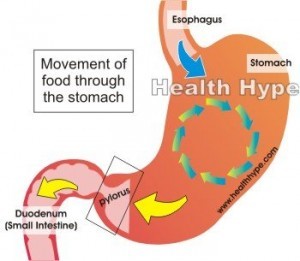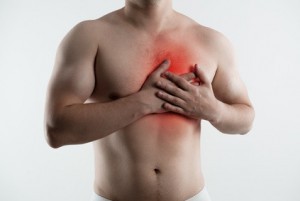Heartburn After Eating Causes (Foods), Remedies, Prevention
Heartburn is a common symptom of acid reflux that most of us experience several times in life. For some people it is a daily battle as chronic gastroesophageal reflux disease (GERD) affects the quality of life in various ways. Heartburn is common at while lying flat, in the very early hours of the morning and after eating. In most cases it is considered as part of indigestion and quickly remedied with antacids. Understanding the cause of heartburn can be helpful in effectively treating and preventing it.
Heartburn and the Lower Esophageal Sphincter
Heartburn is burning chest sensation or even pain. The majority of times it is due to the backward flow of stomach acid and digestive enzymes into the esophagus. These acids and enzyme cause irritation and inflammation of the esophagus which is not equipped to handle these corrosive substances. The main reasons for reflux is a weak or dysfunctional lower esophageal sphincter (LES).
Normally the LES, which is a group of muscles, keeps the junction between the esophagus and stomach closed. It opens momentarily when food has to pass down from the esophagus into the stomach. However, under certain circumstances and in certain individuals the LES fails to function effectively. This means that stomach acid and digestive enzymes can flow up into the esophagus.
It is important to note that sometimes a burning chest pain may not be due to acid reflux. Cardiac chest pain can also present similar to heartburn in most people although it is typically described as a suffocating sharp pain.
Heartburn and Reflux After Meals
Upon eating, the stomach produces larger quantities of stomach acid and releases digestive enzymes. Once food enters into the stomach, the acid and enzymes help to chemically digest the food. It is further aided by strong contractions of the stomach that are part of physical digestion. The increased stomach acid and the strong contractions can then lead to acid reflux especially when the lower esophageal sphincter is weak. It is further exacerbated by certain foods and beverages.
Causes of Heartburn After Eating
The causes of heartburn after eating specifically refer to acid reflux and indigestion. Symptoms like bloating, nausea and excessive belching may also be present. However, it is important to note that other non-digestive causes could also be responsible for the heartburn. Some of these conditions, like angina pectoris or even a heart attack (myocardial infarction), can also present with nausea and similar acid reflux symptoms.
Overeating
Overeating is one of the more common reasons for heartburn after meals. Large quantities of food which may not exit the stomach quickly enough can be pushed backwards into the esophagus while the stomach churns the food, acid an enzymes. Overeating can also distend the stomach significantly and may affect the LES from closing tightly.
Alcohol
Alcohol further contributes to heartburn because it affects the tone of the LES muscles. This means that the LES may not close as tightly as it would. The quantity and sometimes even the type of alcohol may affect the LES to varying degrees. Furthermore alcohol consumption can lead to overeating.
Caffeine
Caffeinated beverages may also increase acid reflux and lead to heartburn after eating. As a stimulant, caffeine increases stomach acid production. Tea, coffee and cola are obvious sources of caffeine but it may also be found in energy drinks and chocolates, including chocolate confectionaries.
Chocolate
Chocolate is a known problem for gastroesophageal reflux disease sufferers. The type of chocolate may make a difference and not all individuals who suffer with GERD may have a problem with chocolate. Cocoa and cocoa powder used in baking may also worsen reflux in some people.
Spicy and Fatty Meals
Most GERD sufferers find that spicy meals worsen the reflux. Similarly greasy meals can also be a problem. Eating a meal that is both greasy and spicy should therefore be avoided in people who suffer with ongoing reflux.
Wheat and Gluten
Although there were a few studies that suggested there may be a link between gluten intolerance and gastroesophageal reflux disease (GERD), discontinuing wheat products like bread is not as yet advocated for dietary management of acid reflux.
Position
Sleeping, lying flat or stooping over after eating can lead to heartburn especially in a person who has a weak lower esophageal sphincter. Gravity helps in preventing the backward flow of the stomach contents. The tone of the LES also reduces when asleep.
Remedies for Heartburn After Meals
- Antacids are among the more commonly used medication to remedy heartburn after eating. If persistent, medical treatment needs to be sought. Antacids should not be used indefinitely as prolonged use of certain types may lead to complications.
- Increase water intake after a meal. It can help wash down any acid that has entered the esophagus and also help with hastening stomach emptying to some degree.
- Take a walk after a meal but do not run or exercise. The movement may help with stomach emptying and being upright utilizes gravity to prevent reflux.
- Milk and other dairy products may be helpful in neutralizing the stomach acid and soothing the esophagus. However, this is for short term relief and large amounts of dairy should not be used to treat acid reflux.
Prevention of GERD after Eating
- Avoid foods that trigger or worsen heartburn. While the more common foods associated with GERD have been mentioned above, some people may react to specific foods even though there is no scientific explanation for why these foods would lead to GERD.
- Do not drink alcohol before, during or immediately after meals. Wait a short period of time after eating and limit the intake of alcohol.
- Eat smaller meals more frequently instead of large meals. Overeating is often associated with having skipped meals as well as intoxication. By eating many smaller meals, overeating can be avoided.
- Do not eat too fast as it may increase air swallowing, hamper proper chewing and even lead to overeating. Meals should be consumed calmly during suitable times.
- Never lie down or sleep after a meal as it can trigger or worsen heartburn. Try not to eat for at least 2 hours before bedtime and avoid late night snacking.





